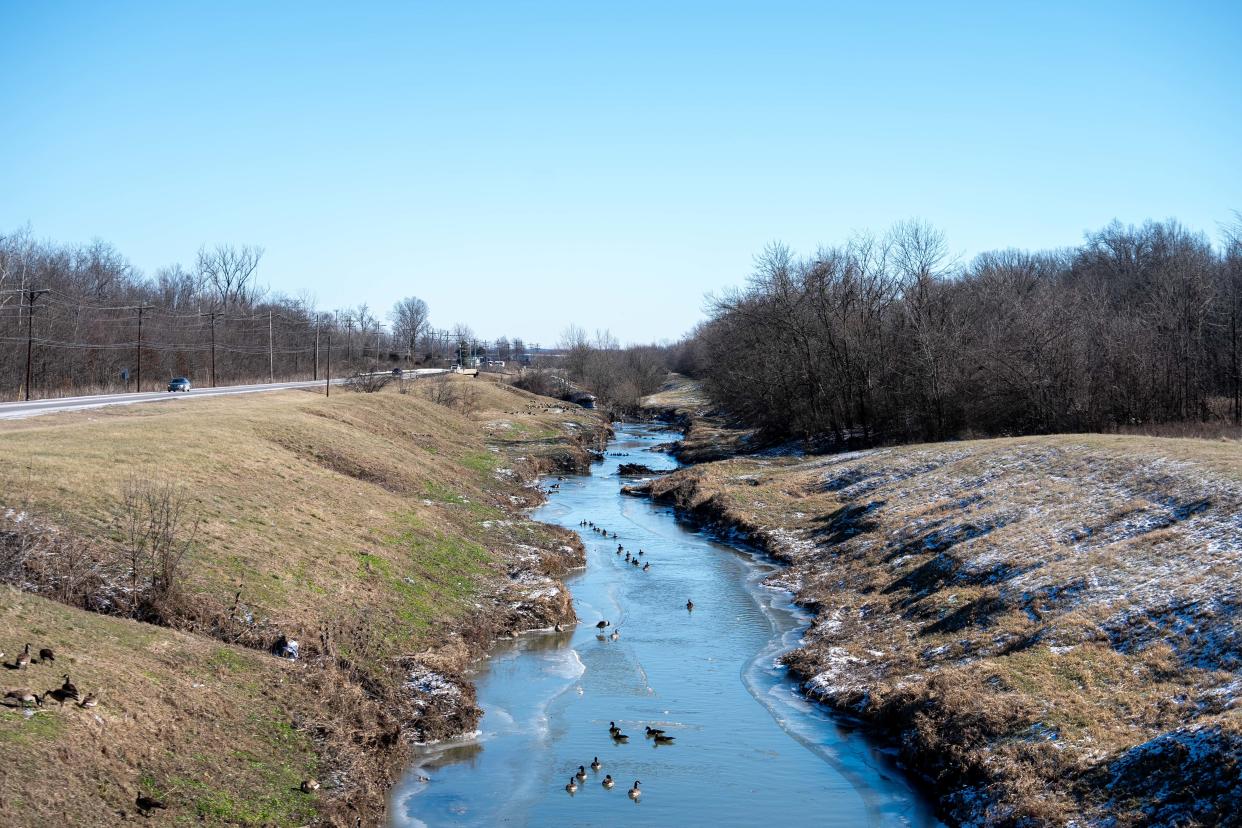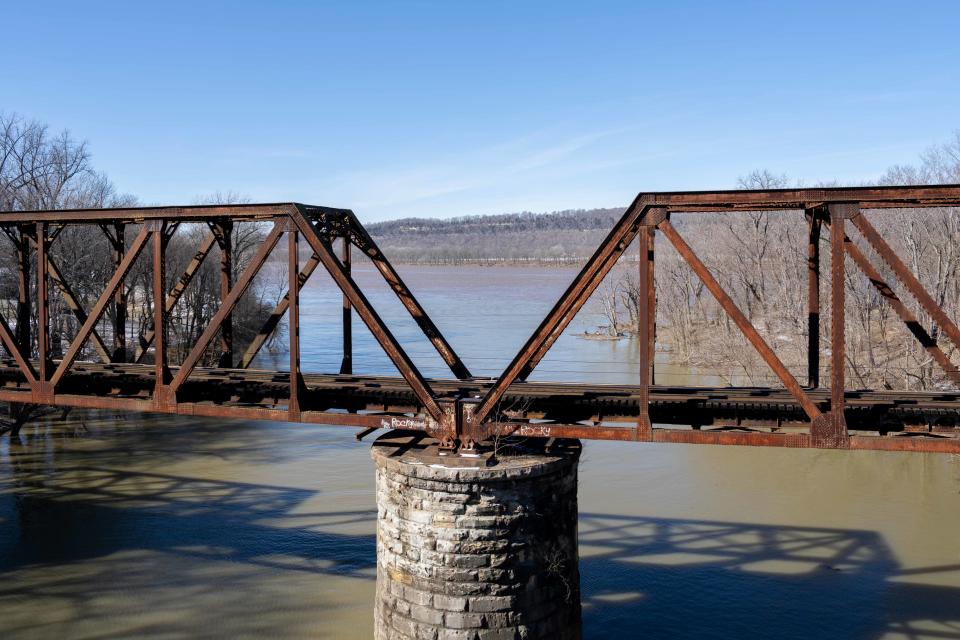With state’s OK, companies in Kentucky may be violating the Clean Water Act, watchdog says

A Kentucky Division of Water program authorizing certain discharges from pipeline tests, gas stations, power plants and other industrial sources may be enabling Clean Water Act violations across the state, according to an analysis by the Environmental Integrity Project.
The state’s off-permit program, or “one-time discharge” program, has authorized releases into Kentucky waterways without a permit about 270 times since 2017, based on public records obtained by the watchdog group and provided to The Courier Journal.
In that time, companies were approved to discharge millions of gallons of effluent through the program, which "likely caused significant environmental harm" to the state's waterways, EIP found.
The group hasn't found another state operating such a program.
And despite the program's name, some "one-time" authorizations were provided repeatedly to the same facilities, records show. Many discharge requests were approved by the state after only a few days.
Through the off-permit program, the state "has greenlighted an illegal off-ramp" to the typical permitting requirements of the Clean Water Act, said Ashley Wilmes, executive director of the Kentucky Resources Council, which has joined EIP in calling on the state to shutter the program.
"These authorizations bypass pollution controls, public notice, public review, monitoring, enforcement mechanisms and other requirements that would apply if a permit were properly issued," Wilmes said.
The state, however, "believes that its one-time discharge authorizations are protective of the environment because prescriptive conditions can be applied to each one," according to a statement from the Kentucky Energy and Environment Cabinet.
“Kentucky signed a memorandum of agreement with the EPA, where they committed to implementing the Clean Water Act,” said Meg Parish, senior water quality attorney for EIP. “Allowing hundreds of polluters to discharge into federal waters without a permit is not implementing the Clean Water Act in Kentucky.”
Worries of a 'blank check' to polluters
In recent years, the Century Aluminum plant in Hawesville received multiple state authorizations to discharge hundreds of thousands of gallons from a tailings pond for the facility, which gathers wastewater from the aluminum production process.
The effluent, reported by the company in 2019 to have detectable levels of aluminum, nickel, antimony and fluoride, was approved for discharge into an unnamed tributary of the Ohio River.
Two years later, the H.L. Spurlock coal-fired power plant on the outskirts of Maysville was authorized to discharge from a sedimentation pond into a tributary of Lawrence Creek, which in turn empties into the Ohio. Testing by the utility identified selenium and thallium in the effluent there.
These two examples represent abuses of Kentucky’s off-permit program, Wilmes and Parish said. Both should have instead been covered by permits, including federal guidelines that apply specifically to aluminum smelters and power plants, respectively, according to EIP’s analysis of the discharges.
In a statement, East Kentucky Power Cooperative spokesperson Nick Comer said the discharges from H.L. Spurlock, highlighted by EIP, were part of a maintenance project allowed by the plant's permit, and said the characterization of "'off-permit authorization' is inaccurate and misleading."
However, records show the company applied for off-permit authorization from the state multiple times in recent years.
Century Aluminum did not respond to requests for comment.
Between 2017-23, more than 40 off-permit applications were approved in Jefferson County, four times more than any other Kentucky county, records show.
Many of those discharges came from LG&E and other utilities for hydrostatic pipeline testing, a method of identifying leaks in the pipeline construction and repair process.
LG&E's use of the off-permit program has "little to no potential for environmental impact," said Chris Whelan, a company spokesperson, and often involves only discharges of water that is either potable or taken from the waterway that would receive the discharge.
Parish, who worked as a water quality regulator in Colorado before joining EIP, said hydrostatic pipeline testing carries a risk of sedimentation — already a designated impairment for many waterways across Kentucky.
Many Kentucky and Louisville-area authorizations also went to gas stations, often to drain excess water as part of underground storage tank maintenance. Discharges from this process risk releasing hazardous chemicals from gasoline, like benzene and toluene, in contaminated groundwater.
The murkiness of Kentucky's off-permit program makes it difficult to prove environmental impact either way, critics argue. For example, the discharges are not reported to the public-facing pollution inventories maintained by the U.S. Environmental Protection Agency, as permitted discharges would be.
Michael Washburn, executive director of the Kentucky Waterways Alliance, expressed concern about the "blank check nature" of the off-permit program.
The way the program's requirements are written would also make proper enforcement of water quality standards nearly impossible under the program, experts said.
The 48-hour notice given to the Division of Water before an off-permit discharge "leaves the state zero opportunity to respond or make sure that water quality standards will indeed not be violated," said Christopher Dalbom, director of the Tulane Institute on Water Resources Law and Policy, in an email.
"If read in the best light possible, the one-time off-permit authorization form would, perhaps, seem reasonable," Dalbom added, "but ultimately useless and unenforceable even by the most highly functioning regulatory agency."
Do you think this is OK? Submit your letter to the editor here.
'Useless and unenforceable'

Last year, Wilmes and Parish wrote a letter to Tony Hatton, commissioner of the Kentucky Department for Environmental Protection, outlining legal concerns with the authorizations. The letter asked the state to shut down the off-permit program immediately and replace it with the appropriate general permits.
State officials are in the process of developing a general permit for hydrostatic pipeline testing, aiming to put out a public notice for this proposal by the end of January. But these tests make up less than half of the state's off-permit authorizations in recent years, and officials have not indicated intentions of ending the off-permit program entirely.
To ensure discharges are in line with the Clean Water Act and various federal requirements, other states have specific general permits for processes like hydrostatic pipeline testing, or underground storage tank dewatering.
“But Kentucky doesn't have either of those, which is striking,” Parish said. “And so instead, what they've been doing is just using this off-permit program as a substitute for having those general permits.”
The off-permit program's persistence could be a symptom of an under-resourced regulatory agency, Wilmes said — cutting corners not out of a lack of care, but a lack of capacity.
“I am sure Kentucky's water quality program is grievously understaffed," Parish said. "Almost every state’s (is), and I'm sure that they don't have all of the resources that they need."
Now, without any indication state officials intend to stop issuing off-permit authorizations, environmental groups have escalated the matter.
A new letter ― signed by EIP, the Kentucky Resources Council, the Kentucky Waterways Alliance and the Kentucky chapter of the Sierra Club ― calls on the U.S. Environmental Protection Agency to intervene and order the state to shutter the off-permit program.
The letter also requests the EPA "conduct a public, formal evaluation" of Kentucky's compliance with federal delegation of clean water permitting.
In a statement to The Courier Journal, the EPA's southeast regional office said it "just recently became aware of KY’s off-permit authorizations," and has been in conversation with state officials about "how these one-time temporary discharges will be covered under (Kentucky's permitting program) in the future."
Connor Giffin is an environmental reporter for The Courier Journal and a corps member with Report for America, a national service program that places journalists in local newsrooms to report on under-covered issues. The program funds up to half of corps members’ salaries, but requires a portion also be raised through local community fundraising. To support local environmental reporting in Kentucky, tax-deductible donations can be made at courier-journal.com/RFA.
Learn more about RFA at reportforamerica.org. Reach Connor directly at cgiffin@gannett.com or on X @byconnorgiffin.
This article originally appeared on Louisville Courier Journal: Kentucky may be approving Clean Water Act violations, watchdog says

